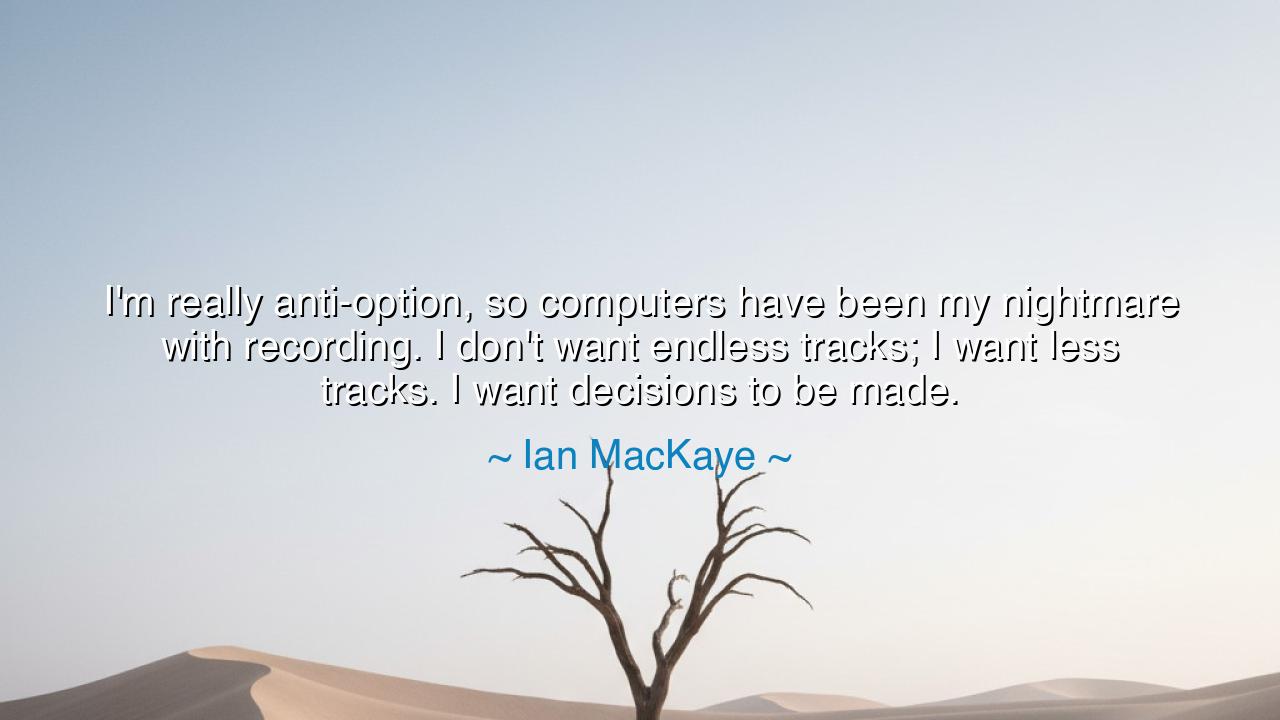
I'm really anti-option, so computers have been my nightmare with
I'm really anti-option, so computers have been my nightmare with recording. I don't want endless tracks; I want less tracks. I want decisions to be made.






“I’m really anti-option, so computers have been my nightmare with recording. I don’t want endless tracks; I want less tracks. I want decisions to be made.” — in this declaration, Ian MacKaye, the fierce spirit of punk and independence, speaks not only of music, but of life itself. His words strike like a hammer upon the iron of modern excess, reminding us that freedom without focus becomes paralysis, and that creation requires boundaries, not infinite choice. Beneath his lament about computers lies an ancient principle: that discipline is the mother of creativity, and that clarity of purpose shines brightest when surrounded by limitation.
MacKaye, known for his uncompromising ethic and stripped-down sound, rejects the illusion that more options mean more art. In his world, the computer — with its endless layers, its infinite undo buttons — represents not possibility, but distraction. Every new track, every new choice, whispers the temptation of indecision. He craves instead the purity of commitment — the moment when the artist must choose, act, and stand by the work as it is. To make decisions, in his view, is to give the soul shape; to avoid them is to drown in potential.
The ancients knew this truth well. Leonardo da Vinci once warned that art is never finished, only abandoned — for the artist who refuses to stop, who keeps layering and refining, risks losing the heart of the work. So too does MacKaye speak of the need to stop, decide, and live with imperfection. In a world obsessed with infinite editing, he calls us back to the human — to the bold act of saying, “This is enough. This is true.” For he knows that art is not born in comfort, but in constraint. The brush must meet the edge of the canvas; the voice must rise against the silence; the decision must be made.
Consider the story of Michelangelo, carving his statues from unyielding marble. Each strike of the chisel was a commitment — irreversible, absolute. There was no “undo,” no endless revision. And yet from that discipline emerged the eternal beauty of David, the tenderness of Pietà. Michelangelo’s genius did not come from freedom of options, but from the courage to make choices within boundaries. In that same spirit, MacKaye’s resistance to digital abundance is not nostalgia, but reverence — for the sacred clarity that comes when the artist must choose wisely and live with consequence.
His words also serve as a critique of the modern condition. We live in an age of limitless possibility — infinite media, infinite voices, infinite tracks of distraction. The world tempts us to believe that every choice can remain open forever. But this illusion breeds anxiety and emptiness. MacKaye’s rebellion — his “anti-option” stance — is thus not mere stubbornness; it is an act of survival. To live meaningfully, we must learn to close doors, to draw lines, to decide. For every “yes” gains its strength from the thousands of “no’s” that surround it.
In this sense, his struggle with computers becomes a metaphor for the struggle of modern humanity: how to stay human amid endless options. When there is no limit, there is no urgency. When nothing must be chosen, nothing truly matters. MacKaye’s demand for fewer tracks is a cry for depth over width, for essence over expansion. He reminds us that art — and life — is not about having everything, but about being fully present with something.
The lesson, then, is powerful and timeless: do not worship abundance of choice; seek instead the purity of purpose. In your craft, in your relationships, in your path — dare to decide. The moment you commit, the work becomes alive. The moment you limit, you find freedom. The computer may offer a thousand tracks, but the soul needs only one melody to sing.
So remember, O seeker of creation and meaning — the endless option is not liberation, but noise. Choose simplicity. Choose direction. Choose to decide. For in a world where all doors are open, wisdom lies in knowing which one to walk through — and in closing it behind you with peace. As Ian MacKaye teaches through his defiant truth, creation begins not when you have everything, but when you finally say, enough.






AAdministratorAdministrator
Welcome, honored guests. Please leave a comment, we will respond soon